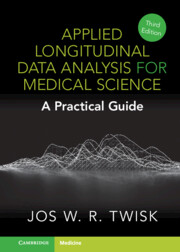Book contents
- Applied Longitudinal Data Analysis for Medical Science
- Applied Longitudinal Data Analysis for Medical Science
- Copyright page
- Dedication
- Content
- Preface
- Acknowledgements
- Chapter 1 Introduction
- Chapter 2 Continuous Outcome Variables
- Chapter 3 Continuous Outcome Variables: Regression-based Methods
- Chapter 4 The Modelling of Time
- Chapter 5 Models to Disentangle the Between- and Within-subjects Relationship
- Chapter 6 Causality in Observational Longitudinal Studies
- Chapter 7 Dichotomous Outcome Variables
- Chapter 8 Categorical and Count Outcome Variables
- Chapter 9 Outcome Variables with Floor or Ceiling Effects
- Chapter 10 Analysis of Longitudinal Intervention Studies
- Chapter 11 Missing Data in Longitudinal Studies
- Chapter 12 Sample Size Calculations
- Chapter 13 Software for Longitudinal Data Analysis
- References
- Index
Chapter 10 - Analysis of Longitudinal Intervention Studies
Published online by Cambridge University Press: 20 April 2023
- Applied Longitudinal Data Analysis for Medical Science
- Applied Longitudinal Data Analysis for Medical Science
- Copyright page
- Dedication
- Content
- Preface
- Acknowledgements
- Chapter 1 Introduction
- Chapter 2 Continuous Outcome Variables
- Chapter 3 Continuous Outcome Variables: Regression-based Methods
- Chapter 4 The Modelling of Time
- Chapter 5 Models to Disentangle the Between- and Within-subjects Relationship
- Chapter 6 Causality in Observational Longitudinal Studies
- Chapter 7 Dichotomous Outcome Variables
- Chapter 8 Categorical and Count Outcome Variables
- Chapter 9 Outcome Variables with Floor or Ceiling Effects
- Chapter 10 Analysis of Longitudinal Intervention Studies
- Chapter 11 Missing Data in Longitudinal Studies
- Chapter 12 Sample Size Calculations
- Chapter 13 Software for Longitudinal Data Analysis
- References
- Index
Summary
In Chapter 10 the analysis of longitudinal intervention studies is discussed. Most attention is given to the analysis of data from a randomised controlled trial (RCT). In light of the discussion, a distinction is made between an RCT with one follow-up measurement and an RCT with more than one follow-up measurement. For both situations, it is argued that a (longitudinal) analysis of covariance must be used for the analysis of RCT data. With an analysis of covariance, an adjustment is made for the baseline value of the outcome variable and therefore, an adjustment is made for regression to the mean. Besides the analysis of RCT data, the chapter also includes a discussion about stepped wedge trials and about the analysis of intervention effects in observational longitudinal studies. Finally, a discussion of the difference in difference method is provided. Also in this chapter, all methods are accompanied by extensive real- life data examples.
Keywords
- Type
- Chapter
- Information
- Applied Longitudinal Data Analysis for Medical ScienceA Practical Guide, pp. 164 - 200Publisher: Cambridge University PressPrint publication year: 2023

